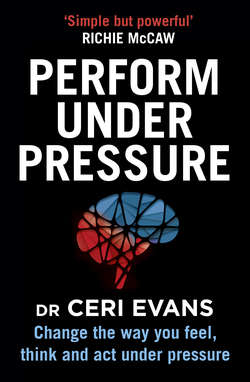Читать книгу Performance Under Pressure - Ceri Evans - Страница 17
1. Emotional regulation
ОглавлениеThe RED system runs essential physiological processes like sleep, hunger, thirst, sex drive and our heart and lung function. We don’t want to think much in most of those situations, so the RED system runs our internal world automatically and unconsciously by monitoring sensory information from our main organs. And we can’t switch it off – it never sleeps, even when we do.
Our RED brain is also constantly monitoring emotional information from our external world. It processes multiple information channels simultaneously to keep pace with cues in our social and emotional environment. The RED system regulates (controls) our emotions, and since our emotional self-control directs our behaviour at all times, the RED system sits at the forefront of how we experience the world around us.
Our RED brain specialises in processing social and emotional information in a non-linear, holistic way. To give us vital split-second reactions, it runs on broad images, impressions and feelings, delivering an unending stream of moment-to-moment, gut-based judgments about our constantly changing world.
The trade-off is that a lot of detail is lost or not processed, resulting in an approximate system that provides rapid judgments at the expense of accuracy. Information is combined to provide an overall synthesis of a situation, rather than being broken down into smaller categories.
To understand this, let’s look more closely at the role of the limbic system in regulating our emotions.
The limbic system adjusts our emotional state in two main ways: by regulating our level of arousal, and by controlling whether this feels good or bad. It’s like an extremely powerful internal thermostat, turning our energy level and emotional temperature up and down in an instant.
Nothing is more important to our day-to-day functioning than emotional regulation because it helps keep our body functioning within certain comfortable parameters, where we operate most efficiently. This maintenance of our physical and mental state within a relatively comfortable mid-range or zone is called homeostasis, an essential process for all living organisms. (We will see that understanding – and overcoming – this powerful force to stay comfortable can unlock our performance under pressure.)
